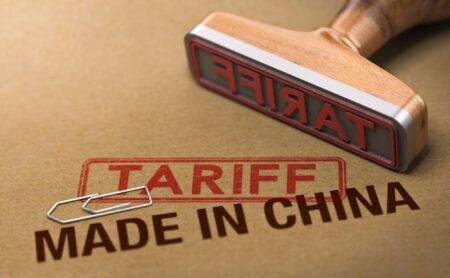The U.S. Federal Trade Commission (FTC) has filed a lawsuit against John Deere over equipment repair practices.
The lawsuit, filed Wednesday morning in conjunction with the State of Illinois and State of Minnesota, alleges Deere & Company has “throttled the ability of farmers and independent repair providers to repair Deere equipment, leaving farmers wholly reliant upon Deere’s network of authorized dealers for many key repairs.”
“Durable, reliable, and easily repairable agricultural equipment is critical to American farmers’ ability to profitably produce their crops,” the lawsuit reads.
Much of Deere’s newer equipment requires a software tool to diagnose and repair electronic problems. The information and knowledge needed to create that software is only available to Deere, the lawsuit alleges. By making this tool only available to Deere dealers, farmers have to go to Deere dealers for repairs rather than completing the repairs themselves or with an independent technician, reducing farmers’ ability to receive timely service and increasing costs.
“Illegal repair restrictions can be devastating for farmers, who rely on affordable and timely repairs to harvest their crops and earn their income,” said Lina M. Khan, FTC chair. “The FTC’s action today seeks to ensure that farmers across America are free to repair their own equipment or use repair shops of their choice — lowering costs, preventing ruinous delays, and promoting fair competition for independent repair shops.”
Andrew Ferguson, commissioner for the FTC and President-elect Donald Trump’s pick for FTC chair, wrote a dissenting statement on the filing. Ferguson said the suit was made in haste to beat President Trump’s inauguration, and shortchanges an ongoing investigation, claiming the FTC lacks the evidence to fit the complaint. He favors settling the litigation “only if that settlement provides real, tangible benefits to America’s farmers.”
The National Farmers Union (NFU) announced its support for the FTC’s lawsuit after filing a legal complaint against Deere in 2022.
“Today’s lawsuits mark a key victory in this fight for family farmers and ranchers, recognizing that monopolies should not stop farmers from being able to repair their own equipment,” said Rob Larew, president of NFU. “When we prevail, farmers will have the power and freedom to fix their equipment faster and at a lower cost.”
Deere’s Response
Deere & Company released an official response to the FTC lawsuit on Wednesday, saying it will defend itself against the “baseless” lawsuit. Deere claims in the statement the lawsuit is “based on flagrant misrepresentations of the facts and fatally flawed legal theories, and it punishes innovation and procompetitive product design.”
“It is extremely disappointing that three commissioners of the FTC chose to file a meritless lawsuit on the eve of the transition to a new administration,” said Denver Caldwell, vice president of aftermarket and customer support for John Deere. “Our recent discussions with the Commission have revealed that the agency still lacked basic information about the industry and John Deere’s business practices and confirmed that the agency was instead relying on inaccurate information and assumptions.”
Deere reaffirmed its commitment to customer self-repair — pointing to the launch of Equipment Mobile in 2023. On Tuesday, Deere announced new tools allowing customers and independent technicians to reprogram Deere-manufactured electronic controllers. The new tools will be integrated into John Deere Operations Center, with the pilot program set for launch in the U.S. and Canada by the second half of 2025.
John Deere declined an interview request, and pointed to the response as its statement.
The Cost to Farmers
The U.S. Public Interest Research Group (PIRG) surveyed 53 farmers across 14 states in 2023 to compare repair costs, labor hours, and downtime from repairs farmers can fix themselves compared to repairs that require an independent or dealer mechanic. On average, the survey found farmers lose $3,348 per year to downtime caused by repair restrictions. When applying those results to the entire U.S., repair restrictions cost farmers more than $3 billion each year.
The surveyed farmers reported dealer mechanics charge an average of $58.90 more per hour of labor than independent mechanics. The higher dealer labor rates raised the downtime costs an average of $1,328 per year — another $1.2 billion dollars nationally. PIRG concludes repair practices are costing U.S. farmers $4.2 billion per year.
In addition to the increased repair costs at dealerships, PIRG noted the labor shortage for equipment technicians means farmers can experience further downtime waiting for authorized repairs. Combined with shorter weather windows, farmers need to maximize uptime to complete each part of the growing cycle.
How Did We Get Here?
The right to repair has been a hotly-contested issue among consumers, advocacy groups, and manufacturers across industries, with the FTC investigating manufacturers like John Deere, Harley-Davidson, and Westinghouse.
In 2019, the FTC began public surveys and empirical research on repair restrictions, and brought its findings before Congress. Through this research, the FTC found manufacturers may — without reasonable justification — be restricting competition for repair services in numerous ways. The pandemic exacerbated these effects as consumers relied more heavily on technology than ever, according to the FTC’s policy statement on the topic.
President Biden signed an executive order in July 2021 calling upon the FTC to limit these practices as a way to promote economic growth in the U.S. This order included a recommendation to the FTC to make it easier and cheaper for consumers to repair items they own by limiting manufacturers’ ability to bar self-repairs or third-party repairs of their products, according to a fact sheet from the White House. The FTC unanimously voted to adopt the order, and to ramp up law enforcement against repair restrictions.
In September 2021, the FTC began an investigation into Deere to learn if the company violated the FTC Act Section 5, which prohibits ‘‘unfair or deceptive acts or practices in or affecting commerce.’’
In March 2022, the NFU filed a formal complaint to the FTC requesting an investigation into Deere & Company, citing Deere’s position as the dominant force in the market, and restricted access to repair information and software. The complaint alleges that by forcing all purchasers of Deere equipment to also purchase necessary repairs from Deere, Deere’s repair restrictions constitute an unlawful tying scheme.
In January 2023, John Deere and the American Farm Bureau Foundation (AFBF) signed a memorandum of understanding (MOU) ensuring farmers and ranchers had the right to repair their own farm equipment. Zippy Duvall, president of AFBF, said this would address issues farmers have accessing repair information and tools, while protecting Deere’s intellectual property.
In a letter to John Deere in October 2024, U.S. Senator Elizabeth Warren (D-Mass.) accused the manufacturer of undermining its own right-to-repair agreements, and evading its responsibilities under the Clean Air Act.
“But over a year [after the MOU], advocates say the tools are ‘redacted or obfuscated,’ John Deere continues to intentionally omit information about repair rights from its manuals, and the MOU appears to have been entirely undermined by your company,” Warren said in the letter.
Deere’s Customer Service Advisor
John Deere launched the Customer Service Advisor tool in May 2022 to provide farmers with a digital database of operator, diagnostic, and technical manuals that was previously available only through dealerships. The software allows users to clear and refresh codes, take diagnostic readings, and perform limited calibrations. Once the issue with a farmer’s machinery is identified, the tool guides them to the part number they need.
Customer Service Advisor is a subscription-based service available for $3,100 per year, plus an interface kit that costs $1,376, for a total of $4,476 the first year. “It does not include comprehensive diagnostic information, nor does it allow farmers to electronically pair parts to the tractor,” according to the 2023 PIRG report. The FTC lawsuit said this tool is inferior to the full-function dealer Service Advisor tool, and lacks many key functions necessary for comprehensive repair.
The subscription model is becoming more common at John Deere as the company shifts into higher-tech precision agriculture. Deere’s See & Spray smart spraying service uses an annual subscription, and future autonomous technology, among other services, will follow suit. According to a Wall Street Journal article from 2021, John May, CEO of John Deere, projected that 10% of Deere’s annual income will come from fees for using software.
Why John Deere?
Virtually all equipment manufacturers have aspects that limit the ability of farmers to engage in self-repair, but Deere may be at the forefront of the FTC lawsuit because of its size, according to John Schwarz II, an ag law attorney and farmer in Indiana.
Deere reported $9.26 billion in revenue for the third quarter of 2024, holding the largest market share in agricultural manufacturing by nearly double the amount of their closest competitor. CNH Industrial reported the second highest revenue of $4.65 billion in Q3, with AGCO reporting the third highest at $2.6 billion.
“Deere is the dominant force in the $68 billion U.S. agricultural equipment market, controlling over 50% of the market for large tractors and combines,” said Jamie Crooks, a lawyer representing the NFU, in the union’s 2022 complaint letter to the FTC. “For many farmers and ranchers, they effectively have no choice but to purchase their equipment from Deere. Not satisfied with dominating just the market for equipment, Deere has sought to leverage its power in that market to monopolize the market for repairs of that equipment, to the detriment of farmers, ranchers, and independent repair providers.”
Farmer sentiment may be another reason agriculture is receiving focus rather than the automotive industry. Out of all groups of people, none view repair as an inherent right like farmers do, Schwarz said.
“Farmers have been fixing their own equipment ever since the first oxen yoke or wagon wheel,” Schwarz said. “That still holds true today in that — if they are able to — the vast majority of farmers will try and fix machinery themselves before taking it to the dealer.”


:max_bytes(150000):strip_icc()/CornStunt-MandyBish_preview-cb2cad209367437b80abb5e4cae3989a.jpg)
:max_bytes(150000):strip_icc()/semi-2000-6fe53400df4c4210bca745be3d47c1be.jpg)



:max_bytes(150000):strip_icc()/50217172322_6ea12a4031_o-2000-0eff3b7170ef4792aac28d7315a8b614.jpg)

:max_bytes(150000):strip_icc()/image_720-307c4058968946b5aa34315f92fe165c.jpg)

:max_bytes(150000):strip_icc()/SusanWoodImages-184997191-2000-16396af3e98e41e3b62570d33e00a00f.jpg)